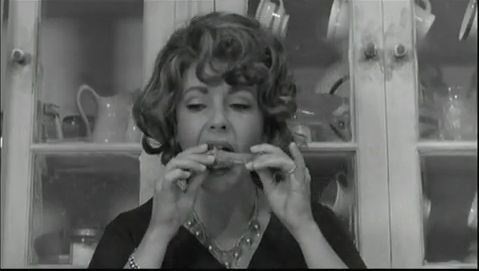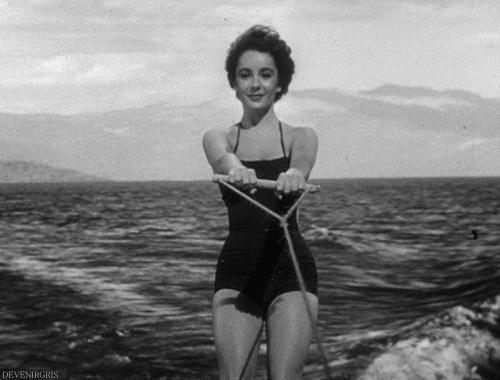Besides its questionable recipes, we examine some of the instruction to be gleaned from the cult-classic diet book Elizabeth Takes Off: On Weight Gain, Weight Loss, Self-Image, and Self-Esteem
There is, to my mind, no better summation of the appeal of Elizabeth Taylor than a statement from the film critic, Molly Haskell. “She was a ‘man’s woman,’” Haskell explains — implying a woman who is, for her beauty, admired by men, but one also so forceful she stands toe-to-toe with them. “She had the ego to survive and become a power.” When pushed to identify which Liz Taylor moment is the defining one, it comes as barely any surprise that the critic picks Giant; a scene in which “she breaks a Southern taboo by straying from the ladies’ conversation to join the men.”
Taylor is, as it happens, a really terrific conversationalist — even in writing while prescribing a diet. A weight-loss book that’s as personable, bright and half-crazy as her Elizabeth Takes Off is rare, especially given our usual miserable motives for shedding the pounds. Prizing her obvious smarts just as much as her obvious good looks, her stark divisions between the importance of happiness in one’s own body and happiness with one’s own self still feel relevant; more so, perhaps, now the cult of celebrity is even more prevalent. “I’ve always tried,” she insists, “to be honest and up-front about almost everything.” Here, we distill the lessons we can learn from Elizabeth Takes Off, a book that she describes as “more than a specific program for weight loss; it’s a chance for you to throw away old self-destructive habits and embrace a more positive way of life,” subtitled as it is, “On Weight Gain, Weight Loss, Self-Image, and Self-Esteem.” Even for those of us who might be perfectly content with our bodies, its teachings are of paramount importance and extend far beyond the superficial. Or maybe they don’t, but they make for a great read.

1. If seeking like-minded dieters with whom to eat, expect to find lunatics
There is a chapter of the book in which Taylor describes the odd weight-loss prompts of a number of strange fellow dieters; all of these people are, somehow, her friends, despite routinely doing things one might expect from a character in One Flew Over The Cuckoo’s Nest while out for dinner. “I have one friend who uses a small tape recorder,” she writes, as if this were the most normal thing in the world. “It’s so tiny he can slip it in his pocket and turn it on without ever taking it out. This is okay, but sometimes he forgets to turn it off, and his friends have become a bit wary about confiding in him. It’s a bit too much like talking to the KGB. He’s also had problems with acquaintances who don’t know about his diet — I mean, it’s a bit spooky to hear someone announce into thin air: ‘fruit cup…fresh orange, grapefruit section, melon balls…beans, green…’”
The sweetest thing about her accounts of these friends is that no eccentricity’s too strange for Taylor to handle — per a section about the local cinema’s snack selection: “I know one woman who takes a cellophane bag full of lettuce leaves [as a cinema snack]. She finds she is content to munch on greens instead of kernels.” But, as she instructs, “When you are dieting, be discreet. You don’t have to report to your acquaintances as though they were the commanding officers of your Great War Against Fat. Even your most supportive friends can become bored.”

2. Protect your greatest assets
Blessed with a face that Richard Burton once described as “a miracle of construction” – half that construction attributable to nature’s and half to, cannily, Taylor — the actress is quick to admit that her good looks are part luck and part work. “God and my Irish grandmother gave me a good complexion and good colouring,” she insists (her colouring being, according to Nancy Etcoff, a Harvard Psychologist, “high contrast” and so “hyperfeminine”), “and while I can’t take credit for my genes, I will take full honours for the preserving of my natural assets.” Remember, you can take autonomy over one's looks if, like Taylor, you are prepared to dedicate sufficient time (and resources) to them.
3. And consider their preservation a priority
In the memoir passages of Elizabeth Takes Off, Taylor survives drug addiction and alcoholism, a long spell in rehab, a number of vicious divorces and, worst of all, both the freak death of her first real, true love, and the loss of her second – though nothing spurs her into action with quite so much alarm as the realisation her bosom is shrinking. “Once, I dropped below 8st. 8lbs,” she admits with genuine horror, as if she’s recalling a trauma, “and I began to lose my bust! Believe you me, I had to put on some flesh in a hurry!” There are passages in which people die where the author uses fewer exclamation points than in this one; that Elizabeth Taylor In Lovely Loose White Swimsuit At The Beach has 300,000 views on YouTube here in 2016 is, happily, a testament to her priorities.

4. Use Taylor’s image to motivate you as you please
In a section subtitled Keep Your Sense Of Humour, Taylor remembers that “someone told me that Debbie Reynolds kept a photograph of me taken during my fattest period on her refrigerator door. She said it reminded her of what could happen if she charged into the icebox. During the initial stage of my diet, I thought, well, if it works for Debbie, it will work for me. I stuck a picture of myself at my worst on the refrigerator, and every time I went to the kitchen, there was my corpulent self reminding me what would happen if I broke my diet.”
While this might sound like an extreme version of interior decoration, having lived in a house where somebody did this with a more recent celebrity, I can vouch for its usefulness – although in a modern, more sensitive age, I’d say one should not do it without the star’s say-so. Liz, for her part, couldn’t care less about the indignity. “If you think a picture of me as Miss Lard pinned up on your refrigerator will help you, too,” she concludes, “I have no objection – there are enough to choose from!”

5. There’s always room for fried chicken
An anecdote which is a) self-explanatory and b) a useful working definition for the conundrum of bossy versus the boss: “On the way back to LA we were scheduled to stop in Washington, and I called John Warner [Taylor’s ex-husband] just before we took off. ‘Hello John, we’ll be at Dulles International for several hours tomorrow, and would love to see you. It would be great if you’d come to the airport and visit. And maybe bring some leftover fried chicken.’” No matter your diet, there’s always room for nostalgic fried chicken.




